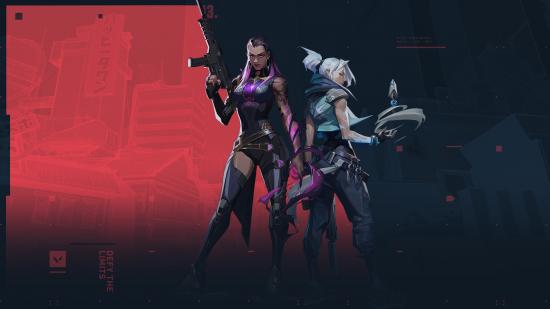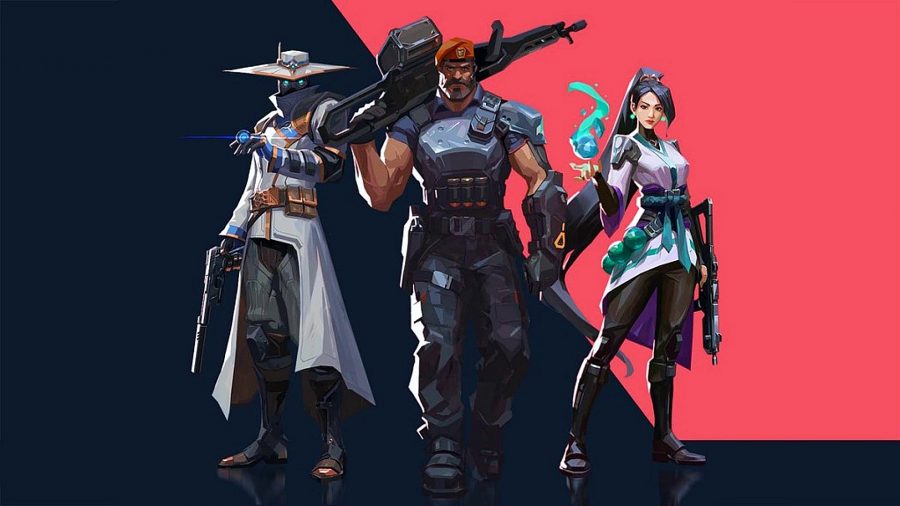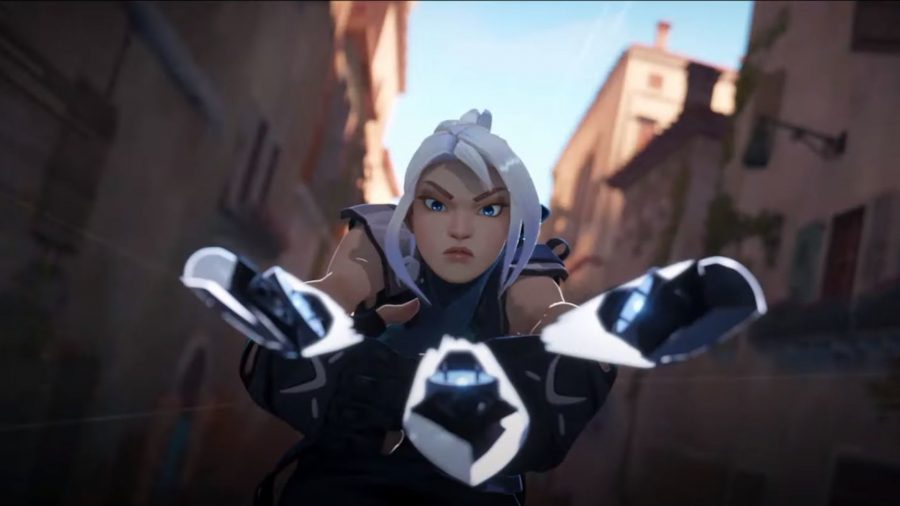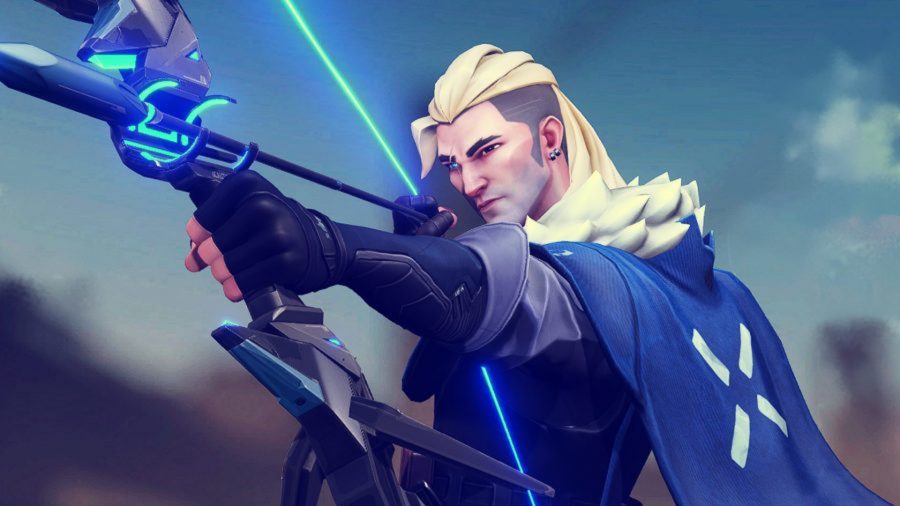In less than a week’s time, the Valorant Champions Tour will get underway. It’s a year-long, multi-region competitive infrastructure that will culminate in an international LAN, titled Valorant Champions, in December. It’s a remarkably ambitious project for a game that was only fully released last summer.
One of the driving forces behind that ambition is a man who, in terms of his lifespan as a Riot employee, is only just older than the game itself. Alex Francois left a six-year career at the National Football League to join Riot and build an esports ecosystem for its three new big hitters: Valorant, Teamfight Tactics, and Legends of Runeterra. He’s the perfect person to talk to about the future of the Champions Tour, so we did just that.
In this in-depth interview – which is his first since becoming a Riot employee – Francois talks us through the process of creating such an extensive competitive infrastructure, how he plans to uphold competitive integrity, and whether Riot has bitten off more than it can chew with its open qualifiers stretching across every region.
The Loadout: Before we dive into Champions Tour, can we get a bit of background on yourself? What kind of work did you do for the NFL before moving to Riot, and has any of it influenced what you’ve been doing at Riot over the past year?
Alex Francois: So I worked at the NFL for six years prior to joining Riot. I worked in two departments over those six years. The first is a department called the Management Council where I started in the NFL as an intern in law school, and it focuses really on contract disputes between players and teams.
After working in the Management Council for four years, I moved over to Football Operations, where my role was rule creation and rule enforcement. So we created rules from everything from the actual playing rules that govern what happened on the field, to the rules that govern how a stadium should be set up on Sunday, to make sure that the playing environment was equitable and fair. That’s everything from holding and illegal tackles to the level of inflation of a football.
Over all of those six years, a lot of my focus generally was creating rules, enforcing rules, and leading investigations. So moving over to Valorant esports. My role here is not only designing our competitive ecosystem, but creating a lot of those rules and policies that govern the sport, setting those internal processes and making sure that we have a robust way of enforcing our rules in a consistent and transparent manner.
You’ve been at Riot for almost a year now, so what’s it been like?
It’s been incredible. Honestly, it’s a weird first year to start any job. I spent two weeks with my colleagues in the office, and I’ve been working from home ever since. But it’s been incredible. I was excited to come over to esports because I think everyone knows the potential it has. And I think if you’re going to come into esports, you can’t do much better than Riot Games.
So onto Valorant esports. Were you surprised by the level of success the Ignition Series and First Strike achieved?
I wouldn’t necessarily say it was a surprise. We were pretty bullish on our plans – we put in a lot of work, so we set a pretty high bar for ourselves. The thing is, success for us is measured in different ways. But our focus really was to have a robust enough scene in this first year to provide enough data for us to learn from. In that regard, we’re really pleased with how the year went, because we had a lot of learnings that we think we can use in the future to make the sport as successful as possible.
And was the plan to always have a large-scale project like Champions Tour for this year, or did that early success accelerate plans to go big for 2021?
Our plan generally was that in 2020, we wanted to learn as much as we could from the community. In 2021, we want to be a little more hands on and have a bit more of an influence on what’s going on, and then in 2022, we want to become even more structured and have even more of an influence on what’s going on.
But as we went through 2020, we saw that an open system should be good, tournaments and circuits should be good. And that picture of 2021 started to crystallise. So we had like a high level general idea. But we weren’t really clear on specifics until we got through the Ignition Series and First Strike qualifiers. Then we realised this is the type of circuit we want in 2021.
You’ve gone all out for an ecosystem that lasts pretty much an entire year. With the experience of LoL thriving on just an eight-month calendar and a fairly big offseason, why go for a year-long competitive experience?
We wanted to make sure that we provided ample content for fans as we saw a really significant, strong appetite in 2020 across a bunch of regions for Valorant esports. But we also wanted to provide ample content for players and teams. A lot of the teams in our ecosystem are amateur teams trying to make a name for themselves, so we figured we’d give these teams and players as many opportunities as possible to show that they belong at the top level.
We feel like now is the time to really put as many opportunities out there as possible.
The format for Champions Tour looks a pretty robust one, but in a COVID-less world, would this have still been your ideal format? Or where some aspects dropped or changed for the pandemic?
Honestly, the format that we landed on was the format that we felt was best for the ecosystem. It looked a little different in terms of qualification as there was a bit more auto-qualification from Masters events. But the way we landed eventually was we took our ideal system, and we basically just tried to make it flexible. Adding Masters circuit points gave us the flexibility to pivot to regional Masters from Global Masters without having too much of a shift to our qualification. So yeah, this was our ideal setup.
Why do you think this format will be able to create opportunities for amatuer or unsigned teams?
This whole structure rests on open qualification. We feel like it’s too early to have invites, and to assume that teams are top-tier. So every Challenger event around the world and all of our regions are led into with open qualifiers. We feel like this type of setup is going to show us who deserves to be top tier, not who should be presumed to be top tier. We think that’s the best way to help these amateur teams show what they have.
Are there any concerns that the openness of these open qualifiers will become a bit overwhelming, as there will likely be hundreds, maybe thousands of teams in big regions?
Absolutely, and as the competitive ops lead, that is something that I think about all day while I’m at work – and even when I’m not working!
Honestly, one of Riot’s biggest strengths is that we have really robust regional teams all around the world. We have offices in every region that are full of folks who’ve been working on esports for years. So many Rioters have worked on League of Legends within their regions, and it gives us boots on the ground. Having that type of infrastructure everywhere allows us to run large scale open qualification tournaments, because it’s less of a burden on a single global team. North America doesn’t have to focus on a thousand players entering a Southeast Asian tournament, because we’ve got a robust, competent team in Southeast Asia who can drive that. And I think that’s our biggest advantage.
It’s really the only way we can pull this off.
First Strike and Ignition Series events went off without any major incidents in regards to cheating or gaining unfair advantages. There were a couple of cases, but it was relatively sound. Is Riot planning on taking any extra precautions to uphold competitive integrity with so much of the Champions Tour being online?
So competitive integrity, for me personally, is the most important thing. And everything we do in competitive ops is built on competitive integrity. We’re working hand in hand with the development team to supplement the approach we want to take. So we have a very close relationship with our anti-cheat team and they now actually have staff and resources who are fully devoted to supporting Valorant esports. So we’re able to do pretty robust scans on each player.
Even if thousands of players sign up for open qualifiers, we are able to dive pretty deep to understand how clean their conduct has been online. We also work with third-party organisations and esports governing bodies to make sure that we’re aware of any kind of suspicious matches that might be happening in the ecosystem.
One of the things we used to say at the NFL is that in competitive operations, your job is to put out fires. But if you’re really doing it, right, your job is to be looking for flammable things. And so for us, we’re just always trying to be on the front foot and be aware of where we might have some exposure. We just want to be ahead of the curve when it comes to competitive integrity.
We’ve also got plenty of backup plans too, so we’ll have alternative patches that we can shift competitions to should a new patch drop [during a competitive stage]. If there is a patch, or an update that affects the game, we kind of just start moving through our next steps to make sure that it doesn’t interrupt the competition.
We may have some hiccups or some bumps in the road because there will be thousands of teams playing almost every day at some points in the year. But we feel pretty good about the backup plans we have in place.
Moving on to coverage of the Champions Tour, how much of it will be broadcast?
The plan is to broadcast our Challenger and Masters events, and obviously Champions. When it comes to open qualifiers, there’s a bit more flexibility there. We want as many open qualifiers to be broadcast as possible. But that’s not mandatory, given the size and the scope.
Related: Everything you need to know about ranked Valorant
What you’ll see at the open qualifier level is a bit of a loose, creative approach to broadcasting. We’ll see some players streaming it, we’ll see some of our third-party TOs streaming on their channels. There’s not a structured approach to open qualifiers but everything else will be broadcast [by Riot]. Once we get to Challengers and beyond, we won’t have players streaming their broadcasts though.
Being such a new esport, there’s very little history to really hang a narrative on. So in terms of creative direction and storylines, how is Riot looking to frame the 2021 Champions Tour?
We’re really leaning into the international aspect. We want to showcase that to the world; showcase that Valorant esports is popping off in a bunch of different places. And then we also want to showcase new stars and new teams. I think those are two stories we’ll focus on: international [competition], and fresh stars, fresh faces.
For the end of the season, we’ve been promised a LAN event for Champions. What progress has been made on finding a host city for the event?
We’re really close. We’re working actively on that and we’ve narrowed it down to a few cities. COVID has made it very difficult to lock in a lot of plans. Essentially, it’s hard enough planning for Worlds, planning for the possibility of quarantine, planning for the possibility of extended travel time being needed – it’s all taken a bit longer for us to lock down those plans. But we should be announcing plans for where Champions will be held in the near future. It’s just, for obvious reasons, taking a bit longer than it usually would this year.
Are the cities on your shortlist all in the same region, or various regions?
So we’ve got cities that we prefer, but they’re pretty much in every region. And that’s part of having that international aspect, both with the story we’re trying to tell and Riot’s footprint in multiple regions. So we haven’t narrowed it down to one or two regions, we feel like we can hold a pretty compelling event in a lot of regions. But we’ve narrowed it down to cities within those regions. And like I said, I think in the next few weeks, or maybe the next like month or two, we should have an announcement for the community there.
In a COVID-less world, where would you personally love to take the Champions Tour?
I think the FPS scene in Europe is extremely strong, so it would be great to have a major event there. Valorant has also really exploded in North America, so I think North America would be a place where we would love to have the event as well. Now, I don’t mean to list off the entire earth here, but I think we’ve got potential in Asia too, because of the League of Legends footprint. So I think between North America, Europe and Asia, those would kind of be the focus areas where we want to end up.
I’ve got a query on rosters that the rules didn’t quite make clear to me. What’s the deal with roster locks? When can teams make transfers?
So teams are free to make transactions and transfers really at any point in the year outside of some small roster lock periods. The way they work is essentially, if you’re playing in Challengers and you qualify for Masters, it’s at that moment that your roster is locked. We don’t want teams to play through Challengers, qualify for Masters, but then sell off a bunch of players whose values increased and then show up with a brand new roster. So the roster lock is a way of saying: ‘Hey, you just qualified for this level of the competition, so please keep the roster the same for that level of competition’.
And is that the same when qualifying for Champions at the end of the year?
So it’s a different mechanic as far as qualifying for Champions is concerned. So if you qualify from the regional Masters events to Champions, we want to keep that roster the same as much as possible.
Related: Our Valorant tier list of the strongest agents right now
As far as the qualification itself – as in who those points live with – we basically could have gone two ways. We could have said that if a team qualifies for champions, and that team leaves their org, we can keep that qualification with the players. Or we can keep that qualification with the org. And what we did was we basically tried to meet in the middle. So if a team has qualified for Champions, if three players leave, the qualification just disappears. At least three players have to stay on the roster for the qualification to stay with the team. If three players leave, the qualification just comes back to Riot Games and [will be passed] to the next [best team].
So we just want to make sure that teams stay together to keep that qualification. If they completely disband, that team is no longer qualified.
Looking into the future, past this year’s Champions Tour, is regional franchising something Riot is working towards in Valorant, seeing as it’s the direction it’s going in with League of Legends?
Franchising is definitely a possibility, and we want to end up in a place where we have some type of partnership with teams. That’s the goal, and we think that’s where a mature esport ends up. What those partnerships look like, is still to be decided. That’s something we’re working actively on. So whether it’s an actual franchise model, or some type of joint venture, or some type of team licencing programme, those are the specific kinds of things we’re working through. Obviously in 2021, we want to focus on this kind of open tournament circuit, because we think we need it, we think we need to know what the talent and the best teams are. And as soon as we’re ready to kind of move to a more permanent, team partner model, we’ll get there.
One of the big things for us is that it can be easy to rush into franchising. But we want to make sure that we have a system that allows teams to be profitable. We want to make sure that teams are sustainable businesses. And we think that, you know, just having teams paying franchise fees very quickly may not be the best way [to make them sustainable]. So we’re working through a bunch of different options, a bunch of different methods. And we’re going to be patient and take our time, because it’s incredibly important to us that these teams are sustainable, because if they’re not, the entire thing falls apart.
Is there a timeframe on when Riot wants to start rolling out franchising for Valorant?
We want to make it through 2021 and then really start exploring within the next two or three years. Whether or not we’re ready is another thing and we don’t want to commit to a date, because like I said, a lot of it is watching and learning. One of our biggest strengths is our ability to be patient. But we also know it’s a key thing to be a mature esport. So we’re not going to wait, you know, 5-10 years, but we’re also not going to commit to like 2022, or 2021, for that matter.



